
Assistant Professor Weihua Zhou, Applied Computing, will present a Chemistry department seminar on Friday, February 12, 2021, from 3:00 to 4:00 p.m. He will present ” Artificial intelligence for medical image analysis: our approaches.”

Assistant Professor Weihua Zhou, Applied Computing, will present a Chemistry department seminar on Friday, February 12, 2021, from 3:00 to 4:00 p.m. He will present ” Artificial intelligence for medical image analysis: our approaches.”

The Institute of Computing and Cybersystems will present a Distinguished Lecture by Dr. Alina Zare on Friday, April 16, 2021, at 3:00 p.m.
Her talk is titled, “Multiple Instance Learning for Plant Root Phenotyping.”
Dr. Zare is a professor in the Electrical and Computer Engineering department at University of Florida. She teaches and conducts research in the areas of pattern recognition and machine learning.
Multiple Instance Learning for Plant Root Phenotyping
In order to understand how to increase crop yields, breed drought tolerant plants, investigate relationships between root architecture and soil organic matter, and explore how roots can play in a role in greenhouse gas mitigation, we need to be able to study plant root systems effectively. However, we are lacking high-throughput, high-quality sensors, instruments and techniques for plant root analysis. Techniques available for analyzing root systems in field conditions are generally very labor intensive, allow for the collection of only a limited amount of data and are often destructive to the plant. Once root data and imagery have been collected using current root imaging technology, analysis is often further hampered by the challenges associated with generating accurate training data.
Most supervised machine learning algorithms assume that each training data point is paired with an accurate training label. Obtaining accurate training label information is often time consuming and expensive, making it infeasible for large plant root image data sets. Furthermore, human annotators may be inconsistent when labeling a data set, providing inherently imprecise label information. Given this, often one has access only to inaccurately labeled training data. To overcome the lack of accurately labeled training, an approach that can learn from uncertain training labels, such as Multiple Instance Learning (MIL) methods, is required. In this talk, I will discuss our team’s approaches to characterizing and understanding plant roots using methods that focus on alleviating the labor intensive, expensive and time consuming aspects of algorithm training and testing.
Dr. Zare earned her Ph.D. in December 2008 from the University of Florida. Prior to joining the faculty at the University of Florida in 2016, she was a faculty member at the University of Missouri.
Zare’s research has focused primarily on developing machine learning and pattern recognition algorithms to autonomously understand and process non-visual imagery. Her research work has included automated plant root phenotyping using visual and X-ray imagery, 3D reconstruction and analysis of X-ray micro-CT imagery, sub-pixel hyperspectral image analysis, target detection and underwater scene understanding using synthetic aperture sonar, LIDAR data analysis, Ground Penetrating Radar analysis, and buried landmine and explosive hazard detection.
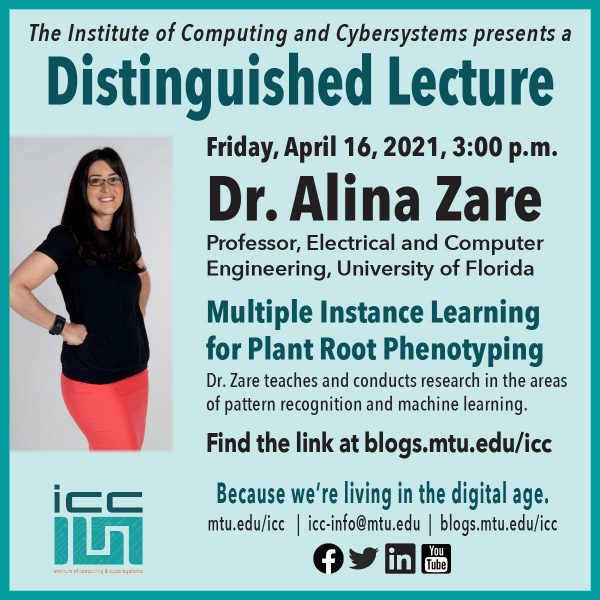

The Department of Computer Science will present a lecture by Dr. Elizabeth Veinott on Friday, February 12, 2021, at 3:00 p.m.
Veinott is an associate professor in the Cognitive and Learning Sciences department. She will present, “Beyond the system interface: Using human-centered design to support better collaborative forecasting.”
Elizabeth Veinott is a cognitive psychologist working in technology-mediated environments to improve decision making, problem solving and collaboration. She directs Michigan Tech’s Games, Learning and Decision Lab and is the lead for the Human-Centered Computing group of Michigan Tech’s Institute of Computing and Cybersystems (ICC).
She has been active in the ACM’s SIGCHI and on the conference organizing committees for CHI Play and CSCW. Prior to joining Michigan Tech in 2016, she worked as a principal scientist in an industry research and development lab and as a contractor at NASA Ames Research Center. Her research has been funded by NIH, Army Research Institute, Army Research Lab, Air Force Research Laboratory, and IARPA.
Teams use technology to help them make judgments in a variety of operational environments. Collaborative forecasting is one type of judgment performed by analyst teams in weather, business, epidemiology, and intelligence analysis. Research related to collaborative forecasting has produced mixed results.
In her talk, Veinott will describe a case of using cognitive task analysis to develop and evaluate a new forecast process and tool. The method captured analysts’ mental models of game-based forecasting problems, and allowed the process to co-evolve with the system design. The tool was tested in a simulation environment with expert teams conducting analyses over the course of hours and compared to a control group. Challenges and lessons learned will be discussed, including implications for human-centered design of collaborative tools.
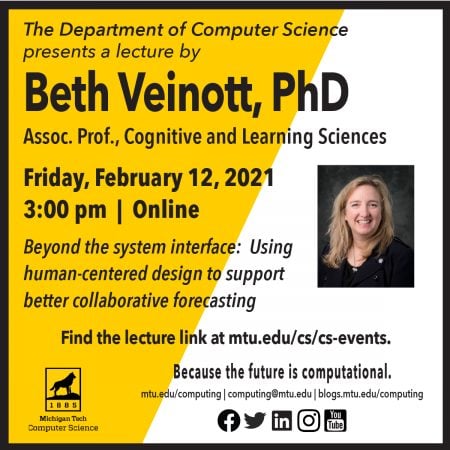
Michigan Tech’s Health Research Institute (HRI) will host a panel discussion on Monday, January 25, 2021,, from 12:00 to 1:00 p.m.
Health research at Michigan Tech has been steadily growing for over 10 years. This growth has led to many practical uses for the technology developed. Three researchers, Dr. Megan Frost (Kinesiology and Integrative Physiology), Dr. Bruce Lee (Biomedical Engineering), and Assistant Professor Dr. Weihua Zhou (College of Computing) will discuss their experiences with start-ups and applying their research to relevant health problems.
by Graduate Student Government
The Graduate Student Government announces that registration for this year’s virtual Graduate Research Colloquium (GRC) is now open. Due to the continuation of the SARS-CoV-19 pandemic, the event will be held virtually to avoid any community spread from taking place.
It is gearing up to be an exciting event, and we are excited to see what everyone has to present. The GRC will be held Thursday and Friday, April 1/2. The event is a great opportunity to work on your presentation skills and prepare for upcoming conferences. Students are free to give an oral presentation, a poster talk, or both. All talks will be scored by judges from the same field as the presenter, who will give valuable insight and feedback on how you to improve the presentation.
Cash prizes are available for the top three places in both oral and poster presentations ( 1st – $300, 2nd – $200, and 3rd – $100). Registration closes at 11:59 p.m., Tuesday March 2, at 11:59 p.m. Don’t wait, register today.
Poster presentations will take place in a pre-recorded video style. Video submission deadline is March 22, 2021. A short Q&A session will take place with judges between 4-6 p.m. on April 1st.
Oral presentation will be a 12 minute talk followed by Q&A session. The event will be capped off with a virtual GRC awards ceremony. All participants and judges are invited to attend. The ceremony will be held from 5 to 7 p.m. April 2, following the close of GRC. Full information can be found on our website.
by Pavlis Honors College
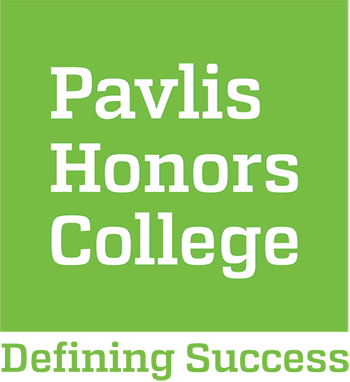
Innovation Week is a celebration of innovation both on and off campus. We will host talks with alumni entrepreneurs, showcase campus innovation and interactive events.
Learn about innovative research, new ventures, solutions to Covid-19 and education prototypes. Connect with alums, students and faculty. Drop in for one event or several!
Register soon to receive a Google calendar invite with Zoom link.
MTU Health Research Institute
Monday, January 25, 12:00 – 1:00 pm
Registration: bit.ly/HRI_talk
Health research at Michigan Tech has been steadily growing for over 10 years. This growth has led to many practical uses for the technology developed. Three researchers, Dr. Megan Frost (Kinesiology and Integrative Physiology), Dr. Bruce Lee (Biomedical Engineering), and Dr. Weihua Zhou (College of Computing) will discuss their experiences with start-ups and apply their research to relevant health problems.
Private Equity Investment for Innovation
Tuesday, January 26, 12:00 – 1:30 pm
Registration: bit.ly/equity_for_innovation_talk
Entrepreneurs exploring financing options for their innovation, future private equity investors, and current equity investors will find this panel discussion with Michigan Tech private equity experts invaluable.
Topics include:
Panelists include: John Rockwell, Karl LaPeer, Tom Nye, and Jeff Helminski
Advanced Power Systems Research Center (APS LABS)
Wednesday, January 27, 12:00 -1:00 pm
Registration: bit.ly/APS_talk
Jeremy Worm of Michigan Tech’s Advanced Power Systems Research Center (APS LABS) will provide an overview of APS LABS and discuss innovative approaches to research, education, and collaboration with industry. A panel discussion with APS LABS leadership will follow the overview.
Michigan Tech’s Advanced Power Systems Research Center (APS LABS) is focused on clean power generation and nearly all aspects of mobility with emphasis on ground vehicle systems. APS LABS is a full service organization conducting fundamental research, applied research & advanced engineering, product development, and validation testing. APS LABS supports commercial partners ranging from start-ups to Fortune 100 companies, and serves in a lead, or sub-role on many government contracts with commercial partners.
IDEA Hub Innovation Hour
Wednesday, January 27, 3:00 – 4:00 pm
Registration: bit.ly/IDEAhub_talk
IDEA Hub leaders will share their innovative education pilot projects and approaches to address the challenges of Education in the 21st Century.
Innovation and Collaboration at the Library Activity
Thursday, January 28, 12:00 – 1:00 pm
Registration: bit.ly/library_innovation
Join us for a fun mixer activity at the Van Pelt and Opie Library in which we’ll see first-hand how collaboration leads to innovative solutions. Libraries are inherently interdisciplinary spaces that can serve as a jumping off point for active collaboration and innovation. Join librarians Jenn Sams and Erin Matas for a speed collaboration activity designed to let you meet new people, see a problem through a different lens, and inspire innovation. They will also share highlights about how the library supports and participates in innovative activities via a Patent & Trademark Resource Center, the 3D printers, and its innovative response to Covid-19.
Bob Mark Business Model Pitch Competition
Thursday, January 28, 5:30 – 7:30 pm
Registration: bit.ly/HuskyInnovateBobMark
Pitch your idea and potentially win some cash! This year, we’ll be accepting two-minute idea pitches (evaluated on uniqueness and potential impact) and four-minute business model pitches (evaluated on scalability and actionable business models.) Register to compete by January 25, or join us in the audience to watch the event. Thousands of dollars worth of prizes offered!
Journey as an Entrepreneur with Hajj Flemings
Friday, January 29, 12:00 -1:00 pm
Registration: bit.ly/Hajj_Flemings_talk
Join us for a talk with entrepreneur and author Hajj E. Flemings, Michigan Tech Mechanical Engineering (‘96) alum. Hajj will share his journey as an innovator and entrepreneur. Hajj has long embraced the entrepreneurial mindset and chose Michigan Tech because he enjoyed solving problems. Hajj is the founder of Rebrand Cities, a brand strategy consulting company that serves clients such as Cadillac, Pfitzer, Walt Disney and the Detroit Lions, to name a few. Hajj authored, The Brand YU Life: Re-thinking who you are through personal brand management.
In 2011 Hajj was featured on CNN’s documentary series, “Black in America: The New Promised Land – Silicon Valley”. During filming of the series, he came to a deeper understanding of the meaning of “digital divide” for communities of color and dedicated himself to creating solutions. His insight led him to become founder and CEO of Brand Camp University, an educational platform that creates technology accessibility and supports job readiness for clients in underserved communities. In parallel, he led a new global civic design initiative within Rebrand City which focuses on eradicating the digital divide by getting 10,000 small businesses online.
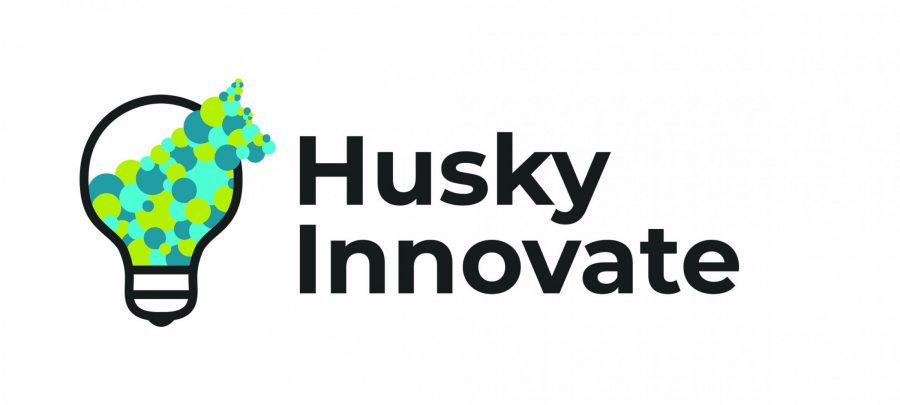
Do you plan to pitch at the Bob Mark Business Model Competition?
Do you have an innovative idea that you want to develop further?
Are you interested in starting your own business or leading an innovative improvement project?
If yes, consider attending the Business Model Boot Camp – a virtual workshop, free to Michigan Tech students.
Using the Business Model Canvas, students will work with members of the I-Corps teaching team to develop a business model for their innovation. We walk through steps involved to help you understand the relationship between your value proposition and the customers’ needs. The more clearly you understand this relationship, the better your position to launch a winning product or service.
If you plan to compete in the Bob Mark Business Model Competition, or if you’d like to learn how to develop a business model, this workshop is for you. There is a capacity of 15 contestants for our Bob Mark Business Model Competition. Priority will be given to those who have completed the Business Model Boot Camp.
This event is hosted by Husky Innovate, a collaboration between Pavlis Honors College, the College of Business, and the Office of Innovation and Commercialization.
New graduate students at Michigan Tech are invited to our virtual Smart Start. In Smart Start, we’ll introduce students to resources and policies to assist them to have a successful start to their graduate careers. It will be especially useful for students in their first year, but all students are welcome to attend.
The seminar will be recorded for any students who cannot attend the zoom meeting. The seminar will be held at 2 p.m. today (Jan. 20) via Zoom. Please register online to receive streaming information and reminders to attend. It will be taped and available online for those unable to attend at that time.

Please join the College of Computing’s Tim Havens at a College of Computing Undergraduate Overview on Tuesday, January 19, from 7:00 to 8:00 p.m. The virtual event is presented by Michigan Tech Admissions. The focus of the event is on prospective students.
Event Details: Check out our diverse selection of majors, including Computer Network and System Administration, Computer Science, Cybersecurity, Electrical Engineering Technology, Mechatronics, Software Engineering, and our first-year computing undecided program, General Computing.
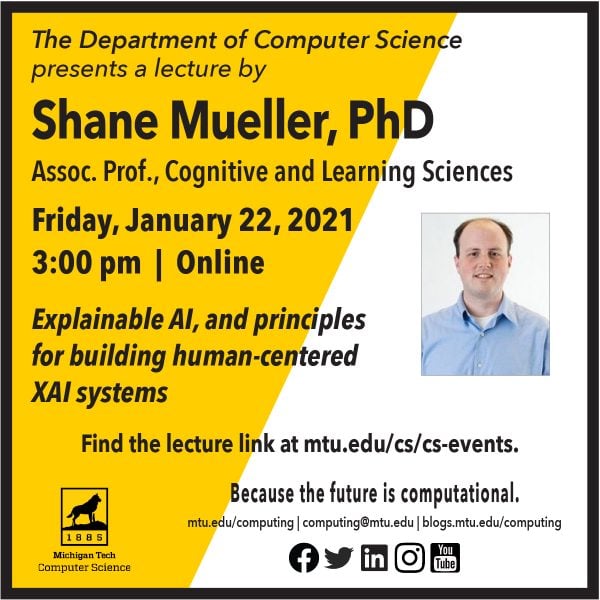
The Department of Computer Science will present a lecture, by Dr. Shane Mueller on Friday, January 22, 2021, at 3:00 p.m.
Mueller is an associate professor in the Applied Cognitive Science and Human Factors program of the Cognitive and Learning Science department. His lecture is titled, “Explainable AI, and principles for building human-centered XAI systems.”
Mueller’s research focuses on human memory and the representational, perceptual, strategic, and decisional factors that support it. He employs applied and basic research methodologies, typically with a goal of implementing formal quantitative mathematical or computational models of cognition and behavior.
He is also the primary developer of the Psychology Experiment Building Language (PEBL), a software platform for creating psychology experiments.
Mueller has undergraduate degrees in mathematics and psychology from Drew University, and a Ph.D. in cognitive psychology from the University of Michigan. He was a senior scientist at Klein Associates Division of Applied Research Associates from 2006 to 2011. His research has been supported by NIH, DARPA, IARPA, the Air Force Research Laboratory, the Army Research Institute, the Defense Threat Reduction Agency, and others.
Explainable AI, and principles for building human-centered XAI systems
In recent years, Explainable Artificial Intelligence (XAI) has re-emerged in response to the development of modern AI and ML systems. These systems are complex and sometimes biased, but they nevertheless make decisions that impact our lives. XAI systems are frequently algorithm-focused; starting and ending with an algorithm that implements a basic untested idea about explainability. These systems are often not tested to determine whether the algorithm helps users accomplish any goals, and so their explainability remains unproven. I will discuss some recent advances and approaches to developing XAI, and describe how many of these systems are likely to incorporate many of the lessons from past successes and failures to build explainable systems. I will then review some of the basic concepts that have been used for user-centered XAI systems over the past 40 years of research. Based on this, I will describe a set of empirically-grounded, human user-centered design principles that may guide developers to create successful explainable systems.